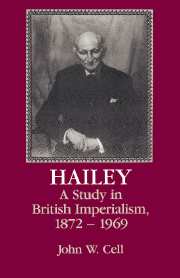Book contents
- Frontmatter
- Contents
- List of abbreviations
- Glossary of foreign words
- Preface
- 1 Early life
- 2 Colonization officer, 1901–1906
- 3 From Sargodha to Delhi, 1907–1912
- 4 Chief commissioner of Delhi, 1912–1918
- 5 A report on the Punjab
- 6 Finance member, 1919–1922
- 7 Home member, 1922–1924
- 8 Governor of the Punjab: the Sikhs, 1924–1925
- 9 Governor of the Punjab: the communal problem, 1924–1926
- 10 Governor of the Punjab: the communal problem, 1927–1928
- 11 Governor of the United Provinces, 1928–1930
- 12 Governor of the United Provinces: civil disobedience and Round Table Conference, 1930–1931
- 13 Governor of the United Provinces: 1931, year of crisis
- 14 Governor of the United Provinces: winding down, 1932–1934
- 15 Surveyor of Africa, 1935–1939
- 16 Two missions to Africa, 1939–1940
- 17 A report and a vision, 1941–1942
- 18 Adviser and propagandist, 1942–1945
- 19 Indian partition and the onset of African decolonization, 1945–1949
- 20 Defender of the faith, 1949–1969
- Bibliography
- Index
2 - Colonization officer, 1901–1906
Published online by Cambridge University Press: 12 October 2009
- Frontmatter
- Contents
- List of abbreviations
- Glossary of foreign words
- Preface
- 1 Early life
- 2 Colonization officer, 1901–1906
- 3 From Sargodha to Delhi, 1907–1912
- 4 Chief commissioner of Delhi, 1912–1918
- 5 A report on the Punjab
- 6 Finance member, 1919–1922
- 7 Home member, 1922–1924
- 8 Governor of the Punjab: the Sikhs, 1924–1925
- 9 Governor of the Punjab: the communal problem, 1924–1926
- 10 Governor of the Punjab: the communal problem, 1927–1928
- 11 Governor of the United Provinces, 1928–1930
- 12 Governor of the United Provinces: civil disobedience and Round Table Conference, 1930–1931
- 13 Governor of the United Provinces: 1931, year of crisis
- 14 Governor of the United Provinces: winding down, 1932–1934
- 15 Surveyor of Africa, 1935–1939
- 16 Two missions to Africa, 1939–1940
- 17 A report and a vision, 1941–1942
- 18 Adviser and propagandist, 1942–1945
- 19 Indian partition and the onset of African decolonization, 1945–1949
- 20 Defender of the faith, 1949–1969
- Bibliography
- Index
Summary
Although his years in the Punjab secretariat had placed Malcolm Hailey near the seats of power in Lahore and Simla, he must have found the apprenticeship frustrating. It was as though his very talent had trapped him. Men with lesser credentials had become assistant district officers at once. Their rugged outdoor lives, exercise of personal authority, and direct service to the “real people” of India all fit the Punjab tradition in which he too had been indoctrinated. The desk man must take care. Too long a stretch in the secretariat, especially if the work were done too well, and people would assume one belonged there. In the Indian Civil Service as in the army the lack of field experience would eventually tell. In short, Hailey needed to run his own show. At twenty-nine he was too young to be a deputy commissioner (district officer), but putting him in at the bottom where he might have gone in 1895 would also have been unjust. The opening of a new canal provided a way out. Although the Lower Jhelum colony in the Jhech Doab tract of the western Punjab's Shahpur district, lying between the Jhelum and Chenab rivers, commonly called the Bar, was smaller than an ordinary district, there would be plenty of responsibility. The next few years were to have an enormous impact in shaping Hailey's adult personality: his basic attitudes, identifications, habits, and instincts. He was to be the first colonization officer. He was to found a new society.
- Type
- Chapter
- Information
- HaileyA Study in British Imperialism, 1872–1969, pp. 13 - 31Publisher: Cambridge University PressPrint publication year: 1992



